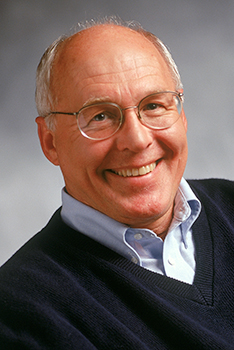 May 20, 2015 – Gary Bakke had big city job offers when he graduated from U.W. Law School in 1965. But this former State Bar of Wisconsin president (2000-01) landed in New Richmond and never looked back, or maybe he looked back a couple times.
May 20, 2015 – Gary Bakke had big city job offers when he graduated from U.W. Law School in 1965. But this former State Bar of Wisconsin president (2000-01) landed in New Richmond and never looked back, or maybe he looked back a couple times.
“Sure, I’ve thought about what it would have been like to work in that big city atmosphere,” said Bakke, who interviewed with firms throughout the country, and almost took an offer from a firm in Minneapolis. “I think I could have made it.”
“On the other hand, New Richmond is such a wonderful place to raise a family. I can walk to work. My old colleague Tom Bell used to say, ‘You can drive an hour one way and see the opera, drive an hour the other direction and go bear hunting.’ He did both.”
A Visionary
Bakke, who celebrates 50 years in the profession this year, may think occasionally on the past. But he’ll be remembered for his visionary thinking about the future, among other things, including a lifelong career as a business lawyer and litigator in New Richmond.
When Bakke served a term as State Bar president 15 years ago, he was taking about change in the legal profession, a sea change to be exact.
Stories and Advice from 50-year Members
Read about other 50-year members in previous issues of InsideTrack:
“Full Circle: 50 Years for Justice Jon Wilcox”
Jon Wilcox played a lot of fiddles in his day. A practicing attorney, trial judge, legislator, state supreme court justice, and a tree farmer – when Justice Wilcox looks back on his career, he can say he did a thing or two, or three.
“Full Steam Ahead: 50 Years for Appeals Court Judge Charles Dykman”
Despite his brother’s warnings that he would have to “work like a dog” to be a judge on the new Wisconsin Court of Appeals, Charles Dykman proceeded full steam ahead. A year later, he was elected and stayed for more than three decades.
“‘Be Courageous’: Helen Madsen, Pioneer in Medical Center Law, Celebrates 50 Years in the Profession”
While she didn’t aim to practice as a lawyer, Helen Madsen’s career encompassed pioneering changes in health law in her position as an attorney with the University of Wisconsin-Madison.
“Alan Levy: The Jimmy Hoffa Story and 50 Years in Labor Law”
Milwaukee lawyer Alan Levy has some good stories to tell, including one involving Jimmy Hoffa. But it’s his 50 years in labor law that takes the cake, and he’s still going.
“Law Degree as License for Activism: Judith Lichtman Celebrates 50 Years”
A 1965 U.W. Law School graduate goes on to fight for rights of women and families in Washington, D.C. as leader of the National Partnership for Women and Families. Judith Lichtman celebrates 50 years as a lawyer in 2015.
“Class of 1965: Celebrating 50 Years in the Legal Profession”
From a Wisconsin Supreme Court justice to a U.S. Congressman, from government lawyers to small town practitioners, the State Bar celebrates the 50-year members.
“A tidal wave of change will roll over the legal profession in the next few years,” Bakke said in 2000. He feared CPA firms and other entities would create increased competition for lawyers. He feared lawyers would lose middle-income clients.
And he feared technology would negatively impact lawyers, and the legal profession in general, if innovative thinking and regulatory changes did not keep pace.
In many respects, what Bakke feared 15 years ago has come true today. Lawyers now face increased competition from CPA firms and entities such as LegalZoom, which have taken a big bite out of the market for legal services, especially for the middle class. In addition, one of the biggest challenges facing the legal profession today is adapting to technological advances.
“I’ve always been a futurist,” said Bakke, a partner and cofounder of Bakke Norman in New Richmond. “I think I was right about some of the issues we would be facing. I may have been too far ahead of the herd, and, although I understood the looming issues, I probably didn’t have the right solutions at the time.”
Now, of course, those discussions are happening. The ABA and state bar associations, including the State Bar of Wisconsin, are trying to navigate the rapid economic and technological changes that are influencing the legal profession’s role in society.
Building a Law Practice
A math and physics major as an undergraduate at U.W.-Madison, Bakke switched to economics. He hoped to enter the business world, where he could work with people. He entered law school, hoping his legal degree would be an avenue to a business career.
“At that time, law school was a good entry into business. I did not intend to be a practicing lawyer, and before going to law school, I knew nothing about the law.”
That changed, when he realized he could be a lawyer for business. Despite job offers in Portland, Oregon, and Minneapolis, he took an interview with a little business firm called Doar & Knowles. Partner Warren Knowles was leaving the firm to be state governor.
“Long story short, I ended up in New Richmond,” said Bakke, who grew up in Menomonie. “I tell people I replaced the governor.”
Bakke spent 20 years at Doar & Knowles, which is now Doar, Drill & Skow. Things were much different then. He started with a salary of $6,500 per year and did everything from personal injury and criminal defense, to estate planning and business law.
Bakke was a small town generalist until the legal profession began to change in the 1980s. Lawyers became more specialized, and Bakke was ready to change his focus.
That’s a Fine Idea! Nominate a 2015 Wisconsin Legal Innovator by June 30

Know a Wisconsin Legal Innovator? Are you one? Tell us about the people and ideas that are changing Wisconsin’s legal landscape. Nominate a Wisconsin Legal Innovator who breaks with tradition to do it better. The Wisconsin Lawyer will feature the people behind the best examples of legal innovation in the November 2015 issue.
Innovation can come in many forms. It could mean:
- New ways to use technology to improve client service or serve a new market
- Best practices for promoting workplace diversity
- New marketing/business development strategies
- New ways of providing pro bono or reduced-cost services
- Changes in internal operations that result in greater efficiency
Learn more or find the nomination form at ThatsaFineIdea.com. The deadline for nominations is June 30, 2015.
In 1985, Bakke left the firm with partner George Norman and a young associate, Thomas Schumacher. They formed Bakke Norman, which now has 14 lawyers.
“It was scary,” said Bakke of starting his own firm. “I wasn’t sure we would ever have clients or earn another nickel, but the transition went well. We didn’t skip a beat.”
In addition, Bakke’s new firm took a different approach than most firms. “We specifically designed our compensation formula and our firm to avoid internal competition,” Bakke said. “That was very pleasant and a breath of fresh air for all of us.”
Bakke started focusing on family law, particularly aspects involving business valuations. He became one of the go-to business valuation lawyers in the region, which created other opportunities in the business law area, including complex business litigation.
Although Bakke opted for the small-town lawyer life, he’s had the pleasure of litigating against big city lawyers, with significant wins against major law firms. “Those moments when you go up against the big firms and come out ahead are very gratifying,” he said.
Before becoming State Bar president, Bakke chaired the State Bar’s Family Law Section, chaired what is now the Law Office Management Assistance Program Advisory Committee, and served on a State Bar committee on law practice technology.
Still Going
Bakke, currently recovering from a recent and near-fatal bicycle injury, still practices law at Bakke Norman part time. He retired from his primary responsibility for litigation and family law matters, but works with other firm lawyers in those areas and does mediation and arbitration work.
Although many other attorneys retire at that stage, Bakke says he plans to keep going. “It’s a privilege to have a place to go see people rather than sitting home and drinking beer in the morning,” he joked. “I have two adopted boys who still live at home with me. I’m here with them, and I really enjoy keeping involved in the community.”
He said the secret to his success has always been his staff and the lawyers around him. “I’ve had wonderful legal assistants, who have been really good, all of them. And I’ve had great law partners, people I enjoy seeing every day,” Bakke said.
 Joe Forward, Saint Louis Univ. School of Law 2010, is a legal writer for the State Bar of Wisconsin, Madison. He can be reached by email or by phone at (608) 250-6161.
Joe Forward, Saint Louis Univ. School of Law 2010, is a legal writer for the State Bar of Wisconsin, Madison. He can be reached by email or by phone at (608) 250-6161.
He tells the story of one legal assistant who navigated the Hague Convention treaties to serve a summons and complaint against a Japanese corporation. The answer alleged improper service.
“I called the opposing lawyer and said, ‘what do you mean improper service?’ The lawyer said, ‘we’ll withdraw the motion, you did it right. But you are the first ones to ever do it right against my client,’” Bakke said. “This was a testament to the great work of my legal assistant.”
He said clients have been the source of great joy throughout his career, but also his greatest frustrations. “I’ve had wonderful clients and not so wonderful ones, which is something every lawyer deals with. But I’ve really enjoyed trying to help all of them solve problems, which is what lawyers do best.”
Although Bakke is entering the twilight of his career, he still thinks a great deal about the legal profession and where it’s headed in the future, and he’s candid about it.
“I see less civility,” Bakke said. “Of course, there are times when lawyers must be aggressive advocates. But litigating every little issue isn’t always the best course. Lawyers should work harder to find common ground in the interest of their clients.”
